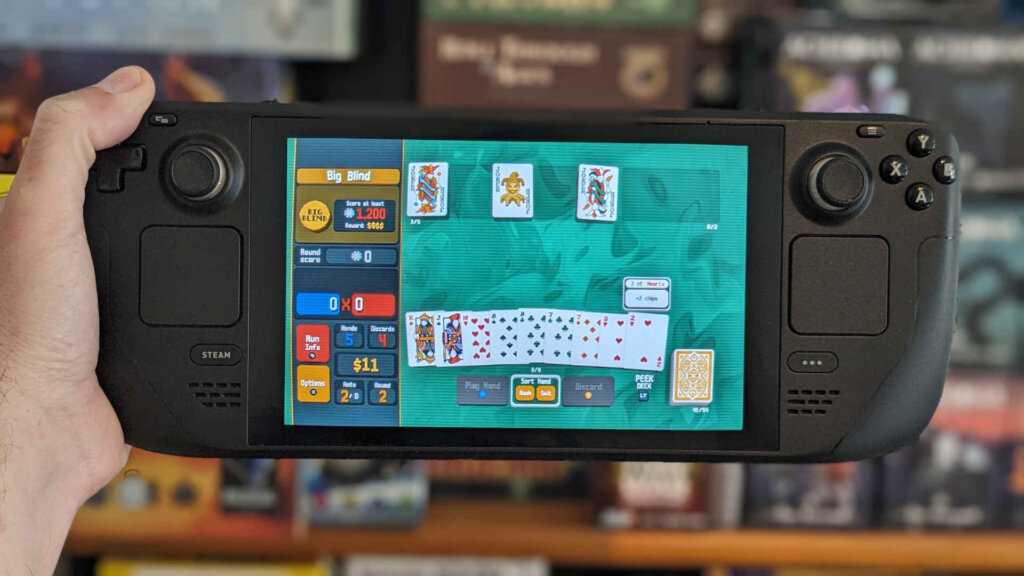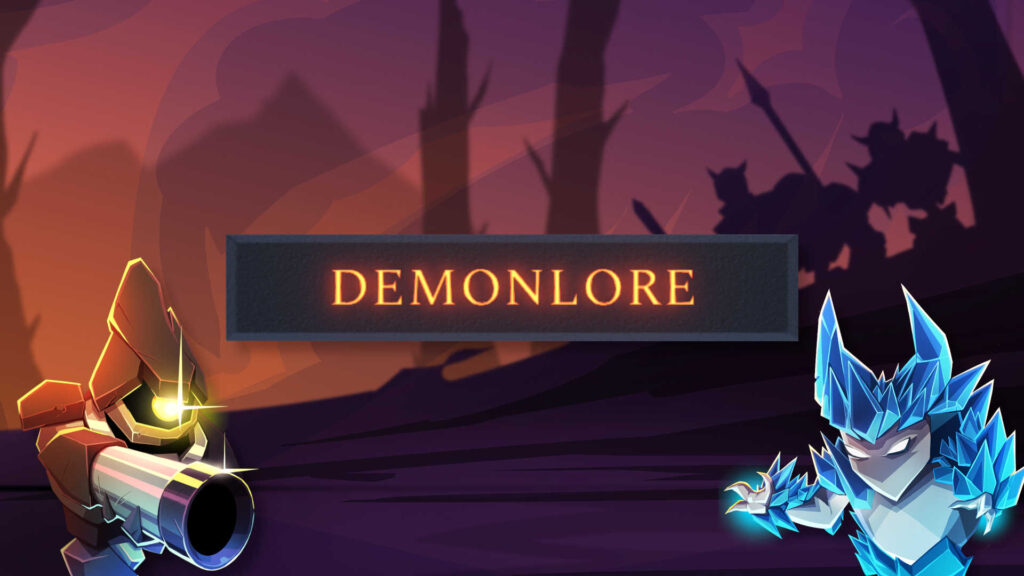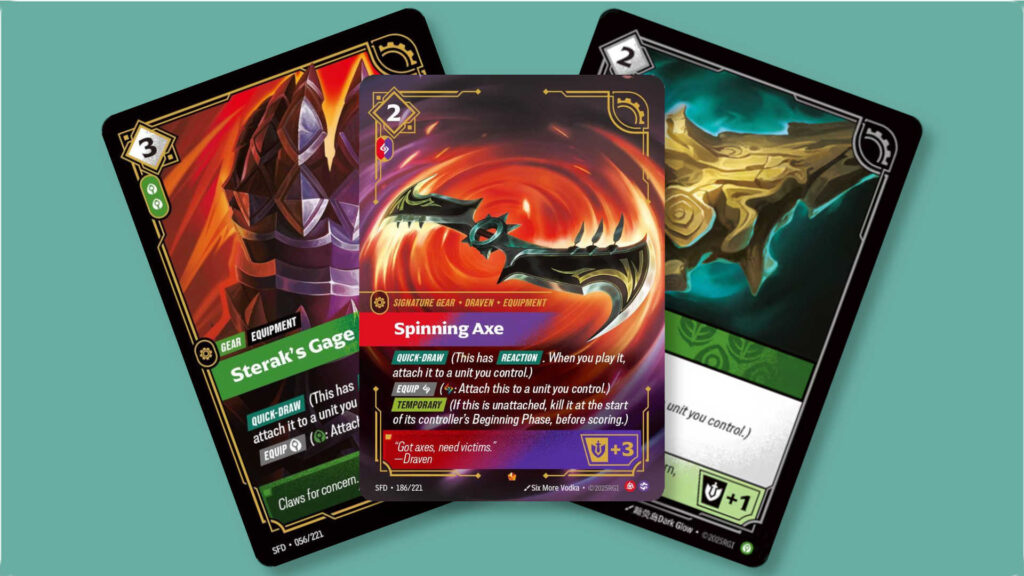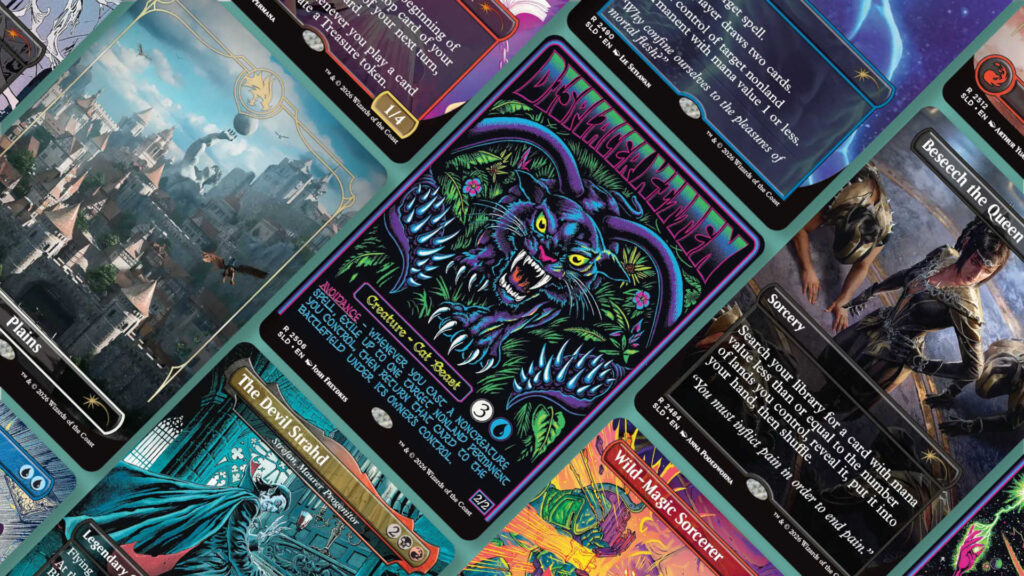It’s time to grab your digital deck of cards, as we check out the best deck building video games!
Despite originating on the tabletop as physical card games, there’s been a big increase in the number of deck building games for computers and consoles in recent years.
There are numerous advantages to playing deck building games digitally, as well as the addition of spectacular audio and visuals, video games can also take away the pain of lengthy set up, bookkeeping and even add card combos or effects that just wouldn’t be possible to track or replicate on the tabletop.
So we here at Card Gamer have checked out numerous deck building video games, discovering some hidden gems in the process.
Which ones did we think are the best though?
Let’s find out, as we check out the best deck building video games!
Table of Contents
Toggle1. Balatro (PC/Mac/Switch/PS4/PS5/Xbox One/Xbox Series S&X, 2024)
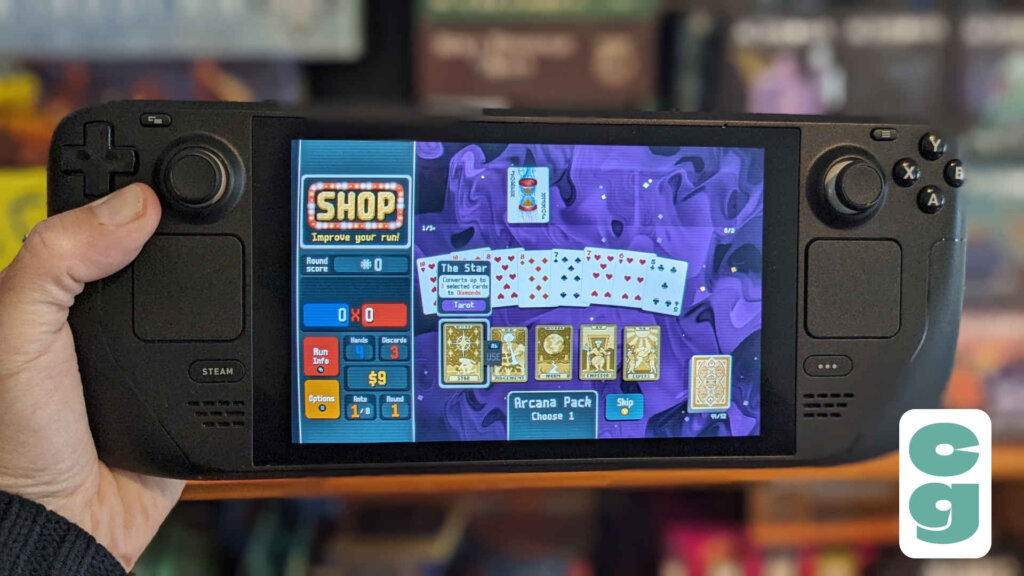
Perhaps a surprising choice for the number one spot on the best deck building video games list, Balatro came seemingly out of nowhere when it was released in February 2024.
It quickly captured the hearts and minds (or should that be hearts, diamonds, spades and clubs?) of critics and the general public alike, racking up numerous plaudits, near perfect review scores and over a million sales in less than a month.
Which is incredibly impressive for an indie title, especially when you consider that Balatro was the work of a solo developer.
So, what’s Balatro about?
Balatro uses a deck of familiar looking cards: a standard poker deck of 52 cards, with all of the number, face and suit cards that you’d expect.
Each round, you try and reach a points target, or Blind; there are three Blinds in an Ante, and 8 Antes to conquer in order to win a ‘run’.
Each Ante consists of a Small Blind, a Big Blind and then a Boss Blind, with increasingly high points targets to hit and, in the case of the Boss Blind, a big handicap that hampers your ability to either play or score cards.
You’ll be playing cards from your hand in each round and trying to score the highest poker hand possible, which doesn’t sound that intriguing or worthy of such acclaim, does it?
However, the real genius of Balatro lies in its intricate and compelling system of points, multipliers and special cards.
Headed up by a massive variety of Joker cards, the special types of cards can create incredibly high scoring combos, upgrade the cards in your deck and much more besides.
The various interlocking systems of cards, points and multipliers creates a potent and addictive experience that’s incredibly hard to put down.
You’ll find yourself going back to it for just one more run, time after time.
Though most deck building video games, as you’ll see when you make your way through this list, have a fantasy or sci-fi theme and story, Balatro goes for a less immediately appealing, more traditional aesthetic and game style, turning up trumps in the process.
If you want to read more in-depth coverage and find out more about Balatro, you can check out my review here.
2. Monster Train (PC/Switch/Xbox One/Xbox Series S&X, 2017)
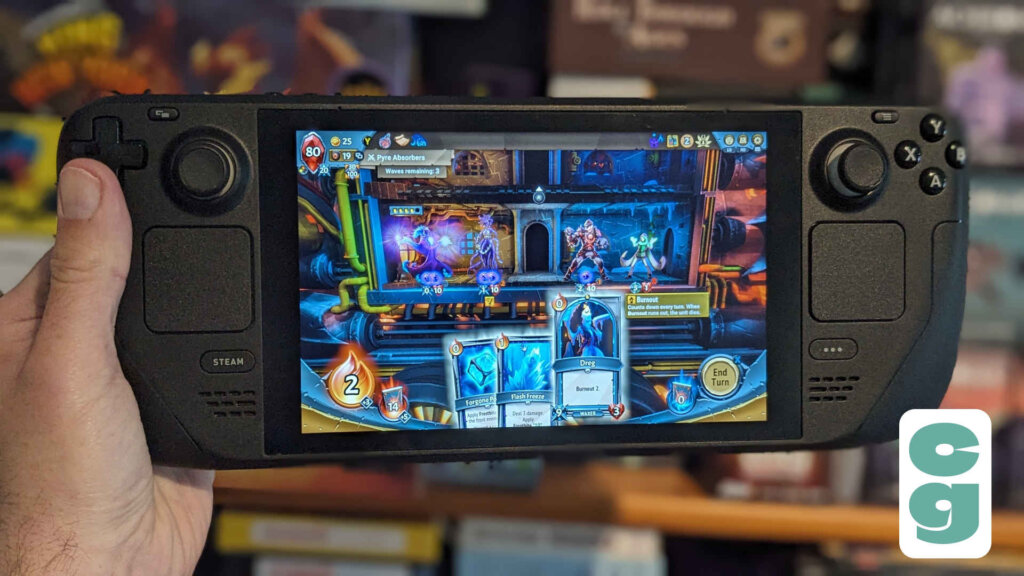
On an episode of the Retrospect podcast (which you can find here) I was introduced and described as a ‘Monster Train aficionado’, so it’s almost certainly no surprise to find me placing the game near the very top of my list of the best deck building video games.
Yet in that very same podcast, I also took the opportunity to point out that I’m actually not very good at Monster Train, having only completed a full run through the game’s series of challenges just a few times.
That certainly doesn’t stop me trying, however, over and over again!
In Monster Train, the player is seeking to protect the last piece of a burning Pyre.
Leading the denizens of Hell, which has frozen over, thanks to a duplicitous attack by the supposedly angelic, heavenly forces of Seraph, the Pyre is kept on the top floor of the eponymous locomotive.
All that stands between the armies of heaven and the last piece of the Pyre that’s keeping Hell alive are you, and your deck of creatures and abilities!
Three floors need to be defended from the invaders, with clever card play, along with the management and upgrading of your deck and artifacts, being the key to success.
You head into battle with your choice of two factions, with each faction having different abilities and creature types that really distinguish them from one another.
The clever verticality, incredible number of cards and even the numerous opportunities to upgrade, expand and add new bonuses to your deck and its characters between stages gives Monster Train a real addictive quality, along with phenomenal replayability.
Once you’ve got over the initial learning curve of getting to grips with what everything does and how things work in its unusual world, Monster Train sinks its demonic claws into you and doesn’t let go!
3. Slay The Spire (Mac/Mobile/PC/PS4/Switch/Xbox One, 2017)
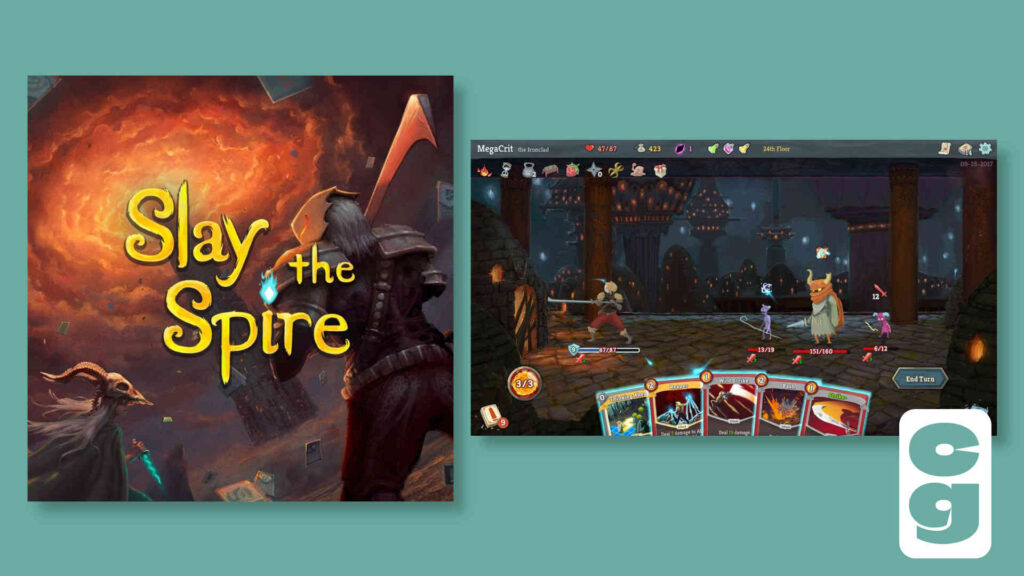
While games like Monster Train have layers of depth that take an impressively long time to explore and uncover, other titles are a lot simpler to grasp.
That’s not to say that Slay the Spire doesn’t have its own hidden depths to uncover, but on the surface it’s a much easier game to visually, and mechanically, get to grips with.
Just like Monster Train, in Slay the Spire you’ll be taking a character through an increasingly dangerous series of encounters, purchasing and upgrading cards along the way, as well as resting in preparation for the bigger fights at the end of each run!
Choosing from a selection of four characters, player must ascend the titular, procedurally-generated Spire – which has a random series of encounters, made up of combat stages, merchants (where new cards, abilities and consumables can be purchased with in-game currency), chests, mystery encounters and even campfires that provide opportunities to recover.
The cards used in combat, as well as the enemies themselves, feature clean and simple iconography, which makes it really easy to grasp the fundamentals very quickly.
Slay the Spire seems to have inspired legions of deck building games since its release, and it’s easy to see why; it’s absolutely one of the finest video games you can play right now on any format.
It’s so difficult to put down, just try not to have just one more go, we dare you!
4. Star Realms (Mac/Mobile/PC, 2014)
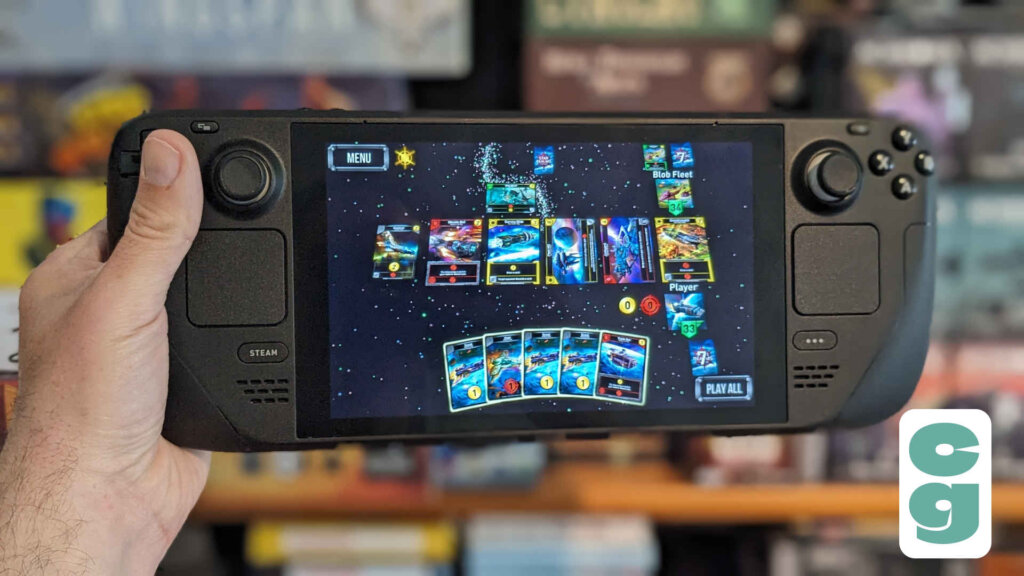
Here at Card Gamer, we’re huge fans of tabletop deck building game, Star Realms, as well as its many expansions, standalone or otherwise.
So why, if Star Realms is primarily a physical game, is it in the list of the best deck building video games?
Well, that’s because Star Realms is available in digital form on numerous platforms, and the app is absolutely fantastic.
It features single player campaigns, robust multiplayer and DLC that covers all expansions that have been published in physical form too.
In Star Realms, players are attempting to whittle their opponent’s Authority down from 50 to zero in a standard game.
Each player starts with an identical deck of cards, made up of basic resource producing ships and a few attackers too.
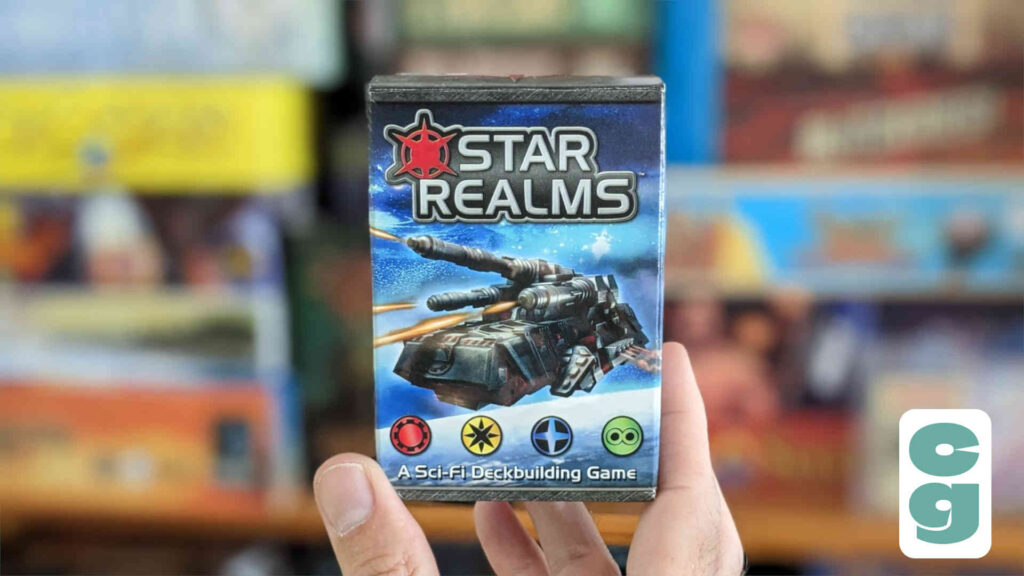
On each turn, players play cards from their hand and use the money these cards produce to buy further ships from a central marketplace row, as well as attack their opponent’s Authority with their ships that have offensive capabilities.
Gradually, players build up a stronger deck that’ll see them combining cards from one of four different factions, triggering bonus combos for ever bigger totals of resources and combat damage.
It’s a hugely satisfying game that, as with Slay the Spire, does a lot to simplify its iconography and minimise card text, making it incredibly straightforward to learn, teach and play.
Games tend to last around 20 minutes and generally feel pretty fast paced; the deck building aspect will often accelerate the power and lethality of each player’s deck pretty fast, until opponents are throwing massive damage at each other for a few turns.
With various formats, including co-op, competitive and the aforementioned, lightly story-based campaigns, the digital version of Star Realms does an amazing job of bringing the game onto the screen.
It doesn’t feel quite as polished as games designed specifically as video games, but the strength of Star Realms is in its superb gameplay, which translates beautifully, no matter the medium.
5. Inscryption (Mac/PC/PS4/PS5/Switch/Xbox One/Xbox Series S&X, 2021)
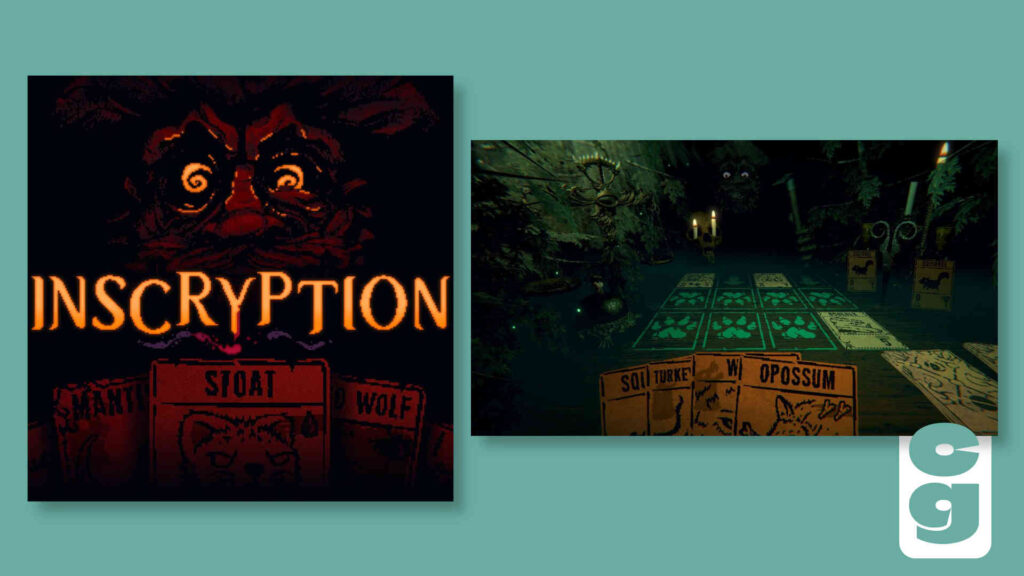
A very meta, almost fourth-wall breaking game that involves found footage and an almost creepypasta style storyline, Inscryption is a game that thrives on an involving, compelling narrative – in contrast to the looser, less story-based feel of most deck builders.
Though the game itself changes as you progress through the narrative, the actual card game of Inscryption remains essentially the same throughout.
It’s essentially a game based around sacrificing your own cards in order to play others, with a creepy, off-kilter ambience.
Part of what makes Inscryption so compelling, aside from a unique, deliberately odd art style and fever dream surrealism, is its narrative, so it’s difficult to say too much here without spoiling the experience for new players.
You’ll just have to take our word for it, that Inscryption is a superb deck building game and a great advertisement for digital-first card games too.
There’s nothing quite like it out there, deck builder or otherwise, and we here at Card Gamer would urge you to take the plunge and check it out!
6. Wildfrost (PC/Switch, 2023)
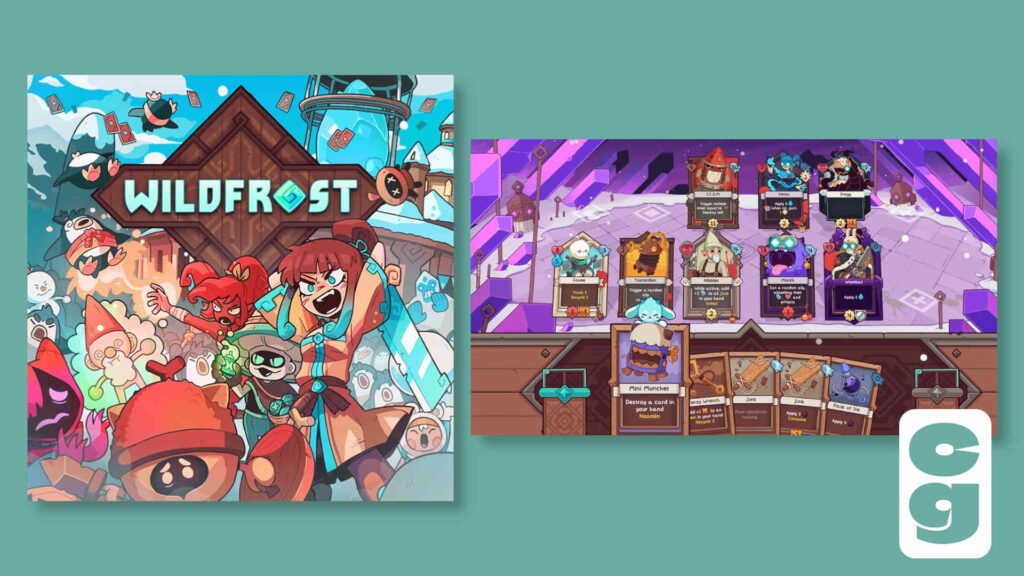
With its charming art style and Slay the Spire/Monster Train-esque roguelite gameplay, Wildfrost appears to position itself as a cosy deck building game with familiar elements that fans of the genre can immediately feel at home with.
You know what they say about judging books by their cover, right?
In this case, ‘they’ are absolutely right, because despite its cute aesthetic, Wildfrost can be incredibly punishing!
So what’s Wildfrost all about then, aside from kicking the butts of players on a regular basis?
In Wildfrost, players set out to reach the Sun Temple, with the aim of ridding the world of the eternal winter that threatens to entirely consume it.
To do this, players build a deck of cards, containing an array of Adventure Time-esque companions and handy items to aid you in your quest, and traverse a map of nodes, containing a variety of encounter types.
Which really will be very familiar to players of other deck builders; even the punishing difficulty is likely to be something that fans of roguelite, card-based games are also no strangers to.
Yet there’s something in the clash between the cute aesthetic of Wildfrost and its overly harsh, often unfair level of challenge that’s caused it to drop a few places on this list.
We’re gluttons for punishment here at Card Gamer, but when something feels outright unfair, as Wildfrost often does, that can be a bit of an issue.
Still, it’s a beautifully produced game and if you can persevere with Wildfrost, it’s absolutely worth the effort.
Just don’t say we didn’t warn you!
7. Magic: The Gathering Arena (Mac/Mobile/PC, 2019)
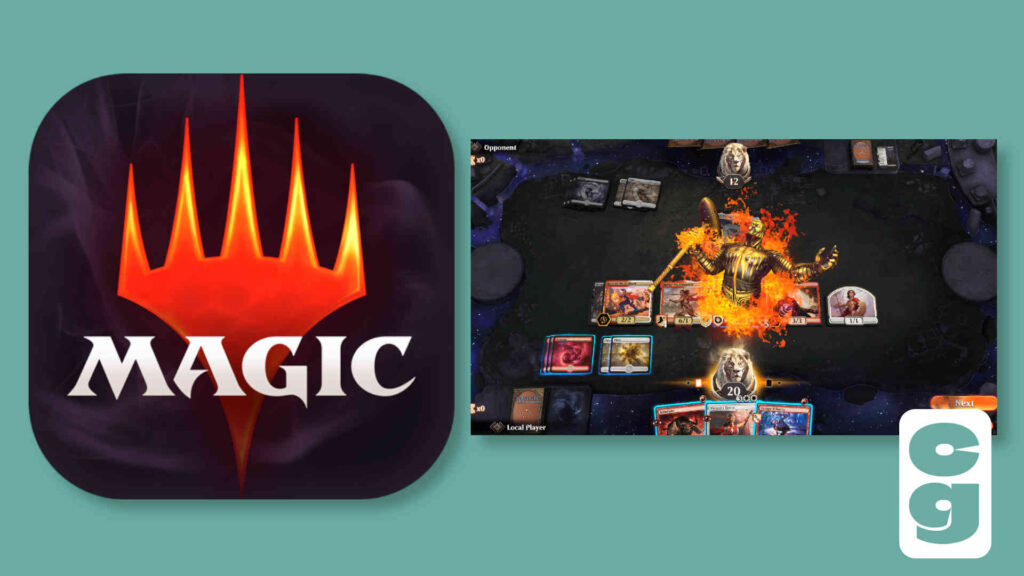
It might seem strange to see such a highly regarded game so relatively low down on the list of the best deck building games, particularly as it’s one of the very earliest examples of the genre, but there’s a good reason for having Magic: The Gathering Arena in this spot.
Though the gameplay remains just as superb and finely tuned as it was back when the physical game launched in 1993, this digital version of Magic: The Gathering can be extremely overwhelming for newcomers.
Even veterans may find the deck building a little fiddly, given the many thousands of cards that are on offer within the digital game.
To its credit, Magic: The Gathering Arena does a fantastic job of keeping up with the relentless release schedule of its physical counterpart, with new sets often launching just ahead of the retail release of the card-based products.
It’s not just the deck building aspects that can be a bit of a struggle if you don’t have particular strategies or deck lists in mind, however.
That’s because matchmaking will often pit players of wildly different skill and experience levels against each other – which can make for an unnecessarily frustrating or unsatisfying game, depending on which end of the scale you sit.
There’s no denying that, when two players of equal, or close enough, skill come together, however, there’s true (ahem) magic here; the timeless gameplay and the near endless options available to players in putting a deck together can be an incredible experience.
Once past the comprehensive and very useful tutorial, a great selection of decks opens up with much more in terms of strategies and abilities available than you may expect for a selection of free cards.
There’s also an ever evolving list of free booster packs and cards on offer too, meaning that you really don’t have to sink as much money into playing and enjoying Magic: The Gathering Arena as you may expect.
8. Roguebook (Mac/PC/PS4/PS5/Switch/Xbox One/Xbox Series S&X, 2021)
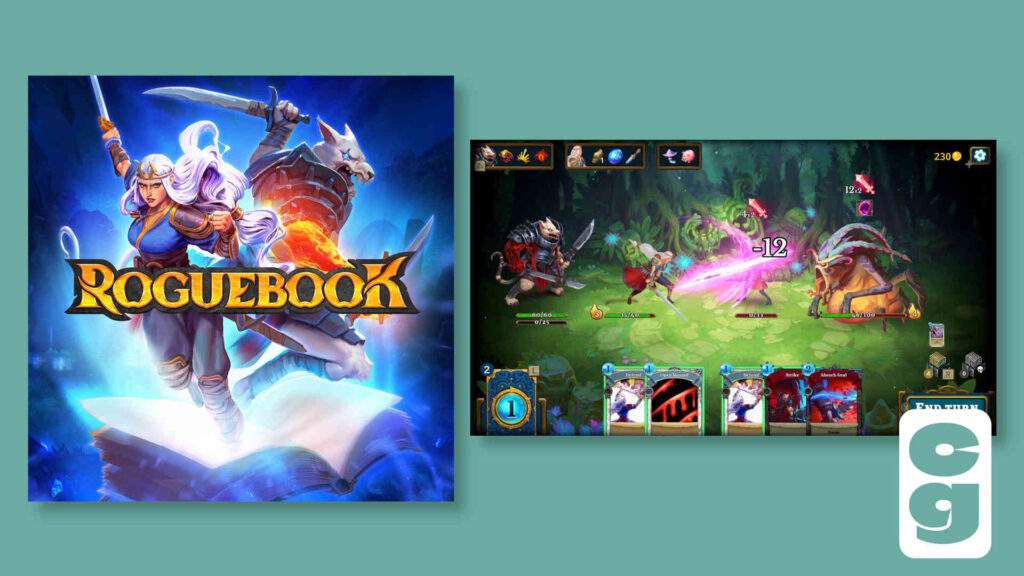
The creator of Magic: The Gathering, Richard Garfield, has had a hand in numerous other card games over the years, including this visually spectacular deck building game from 2021.
A board game/card game hybrid which sees your chosen character exploring a gorgeous, fairy tale style fantasy world across a hex-based grid, Roguebook’s deck building elements come into play during its combat encounters, as is the case for so many other titles on the list of the best deck building video games!
It’s an intuitive and well made game that seems to have unfortunately flown under the radar of many gamers, but absolutely deserves much more exposure than it already has.
Much like Monster Train’s factions, in Roguebook you’ll pick two characters that determine the style and construction of your initial decks, using limited brush strokes of ink to reveal hexes in the world around you, building yourself up before taking on the boss at the end of the stage you’re currently on.
The storybook setting extends to the fact that you’re uncovering pages on the hex grids of the titular tome; it’s cleverly designed and, just like the majority of roguelite deck building games, challenging and occasionally punishing, yet always addictive.
9. Pirates Outlaws (Mobile/PC/PS4/Switch/Xbox One/Xbox Series S&X, 2019)
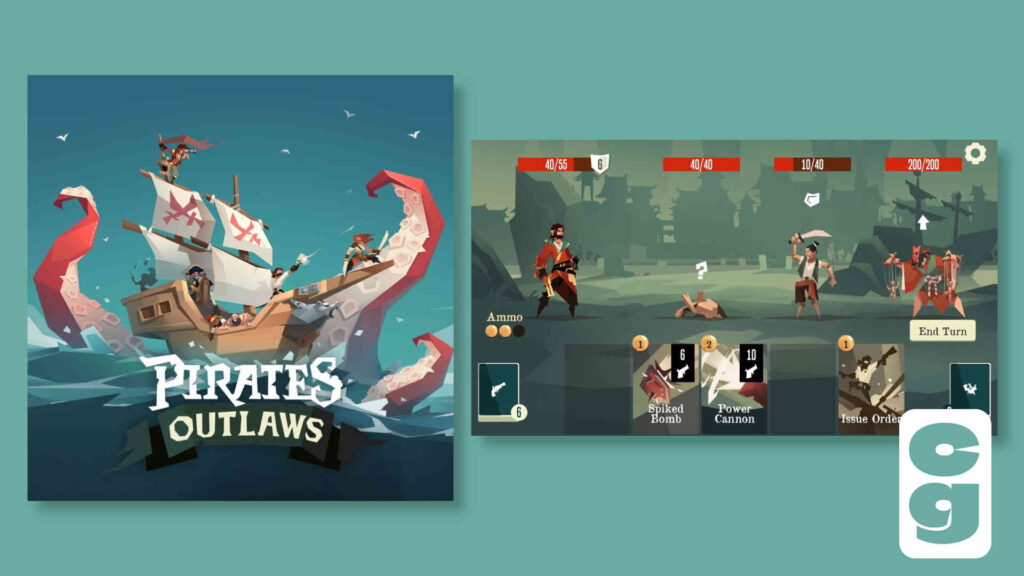
A little known deck building game from a very small studio, Pirates Outlaws is a surprisingly robust title that seems to take several cues from other games in the roguelite deck building genre, but also has enough tricks of its own up its buccaneering sleeves that it’s well worth checking out.
As with Wildfrost (as you’ll soon see!), Monster Train and Slay the Spire, the gameplay in Pirates Outlaws consists of choosing a route on a map between combat encounters, then carrying out said encounters using your deck of attacks and items.
The lo-fi visual aesthetic, likely due to its mobile game origins, gives Pirates Outlaws a unique and appealing style, but what really makes it stand out are the mechanics governing attacks.
Melee attack cards are ‘free’ to play in terms of action cost, but of course can usually only reach the closest enemy to the player.
Ranged attacks are often more powerful and, as you’d expect, far reaching, but require ammo cards to play, as the number of actions available is related to how much ammunition you currently have loaded.
It’s a really neat, thematic touch that requires thoughtful, considered play, and nicely sets Pirates Outlaws apart from its peers and its sources of inspiration.
If you’re a fan of roguelite deck builders, don’t overlook Pirates Outlaws; it may be somewhat derivative, but it’s a straightforward and enjoyable deck building game.
As it’s from a tiny indie studio with, presumably, a much smaller budget for marketing, Pirates Outlaws has flown under the radar somewhat, but it’s definitely a game I can recommend checking out.
10. Neurodeck: Psychological Deck Builder (Mac/PC/Switch, 2021)
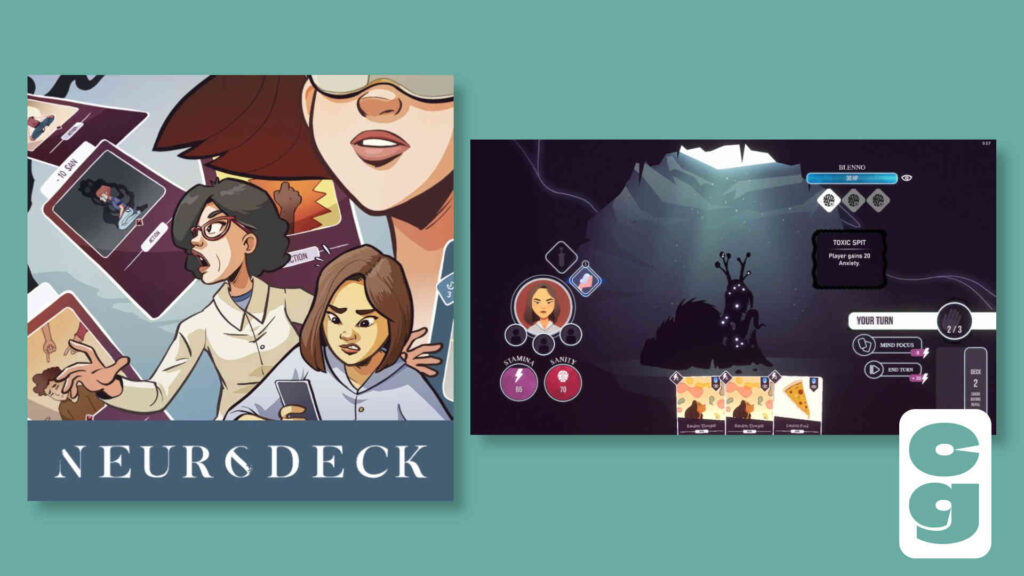
Another roguelite deck building game that takes inspiration from the structure of titles like Slay the Spire and Monster Train, Neurodeck is an extremely interesting and unusual take on the genre.
That’s because its enemies are phobias, twisted into nightmarish visual representations of the real life conditions.
Your deck is built around cards that represent ways to cope with said phobias, with the aim to keep your Stamina and Sanity levels above zero.
Taking psychological tests between rounds of combat against phobias can gain you new abilities and card improvements too.
Though some of the mechanics are poorly explained in the game’s somewhat lacking tutorial, if you can get your head around the unusual mechanics and visual style, Neurodeck is an incredibly addictive game and a great addition to an ever more crowded genre.
Do be warned, however, that Neurodeck does depict genuine mental health conditions, phobias and coping mechanisms.
Everything is treated in a fairly abstract way, but some players may find Neurodeck’s handling of those conditions a little lacking in sensitivity.
So there you have it, Card Gamer’s list of the best deck building video games.
Let us know what your thoughts are on social media; we’d love to hear from you!


